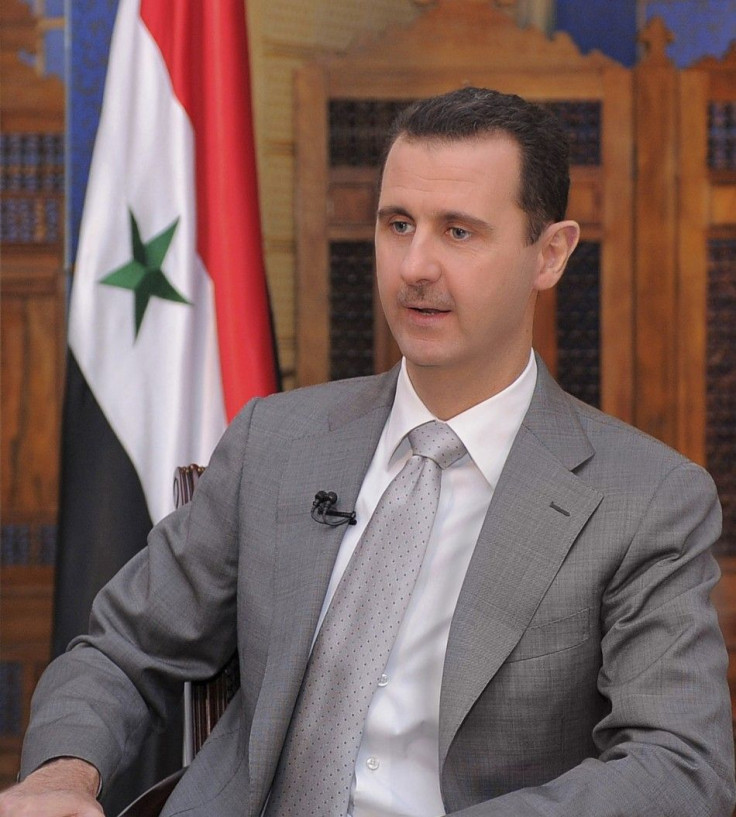Assad Plans Address to Syrians on Unrest

(Reuters) - Syria's President Bashar al-Assad, locked in a violent struggle against a wave of unrest, is to make a speech Tuesday on the internal issue and international and regional developments, state media said Monday night.
The official SANA news agency gave no further details. Assad, whose forces are accused of killing thousands of protesters over the last 10 months, is coming under increasing scrutiny from neighboring states.
Recep Tayyip Erdogan, prime minister of Turkey, said Monday his country was threatened by the conflict and should take a leading role in dousing it.
The situation in Syria is heading towards a religious, sectarian, racial war, and this needs to be prevented, he said.
The Arab League, which suspended Syria in November and announced sanctions, has sent a monitoring mission to Syria intended to judge whether it is complying with a peace plan calling for a withdrawal of troops from cities, prisoner releases and political dialogue.
Syrian opposition figures said Monday the League mission, which began work two weeks ago, has so far succeeded only in giving Assad's government more time to violently crush its opponents.
After a review meeting in Cairo on Sunday, the Arab League said Damascus had only partly implemented its pledges.
Adnan Khodeir, head of the monitors' operations room in the Egyptian capital, said more observers would reach Syria this week, bringing the team's strength to 200 from 165 now.
The initial report is too vague, and it essentially buys the regime more time, said Rima Fleihan, a member of the Syrian National Council, a leading opposition group in exile.
We need to know what the League will do if the regime continues its crackdown in the presence of the monitors. At one point it needs to refer Syria to the U.N. Security Council.
The League appears divided over whether to take such a step, which in the case of Libya led to foreign military intervention that helped rebels topple Moammar Gadhafi.
Russia and China have opposed any Security Council move on Syria, while Western powers hostile to Assad have so far shown little appetite for Libya-style intervention in a country that sits in a far more combustible area of the Middle East.
A U.S. State Department spokeswoman said the United States stood ready to provide the League monitors with technical help if asked.
Gunfire erupted near a car carrying Arab monitors away from an anti-Assad demonstration they had attended in the turbulent city of Homs on Monday, but no one was hurt, activists said.
As with most events in Syria, where most independent media are banned, it was impossible to verify the account.
Rami Abdulrahman, of the British-based Syrian Observatory for Human Rights, said keeping the Arab monitors in Syria without a substantial increase in their numbers would only give the regime more time to deal with the Syrian revolution.
TANKS HIDDEN
He said Syrian authorities had hidden tanks in military and security compounds or repainted armored vehicles in blue police colors to mislead monitors. Only a small proportion of the thousands of detainees seized during the unrest had been freed, he added.
Syrian officials say they are fighting terrorism by subversives armed from abroad, not a broad-based revolt against more than four decades of Assad family rule. The authorities say their foes have killed 2,000 security force members.
Arab League officials said the future of the monitoring mission, due to make a full report on Jan. 19, depended on the Syrian government's commitment to ending the daily bloodshed.
If the ... report comes out saying the violence has not stopped, the Arab League will have a responsibility to act on that, Qatari Prime Minister Sheikh Hamad bin Jassim al-Thani told a news conference after the Cairo meeting.
There was no formal Syrian government response to the Cairo meeting, but the state-appointed mufti Ahmed Hassoun, Syria's most senior Muslim authority, gave a defiant message.
The land of Sham (Syria) will not be humiliated, he said in a Damascus church during multi-faith prayers for 26 people the government said were killed by a suicide bomber on Friday.
Those who want Syria to be an arena for their own agenda against the will of its people, I say to the Arab League and to the United Nations that Syria has angels ... that will fly over it until resurrection day, Hassoun said.
The League communique called on the Syrian opposition to present its own political vision and asked the League's secretary general to convene a Syrian opposition meeting.
Syrian opposition groups have struggled to unify or to form a widely accepted representative council.
They are split over the role of armed resistance in what began as a peaceful protest movement, the weight Islamist groups should have in any joint opposition body, and the scope for Arab, U.N. or other external action to drive Assad from power.
Opposition leaders meeting in Istanbul gave Burhan Ghalioun a one-month extension as head of the Syrian National Council on Monday, after earlier rejecting a draft accord he had signed with a rival opposition group.
(Editing by Andrew Roche)
© Copyright Thomson Reuters {{Year}}. All rights reserved.





















